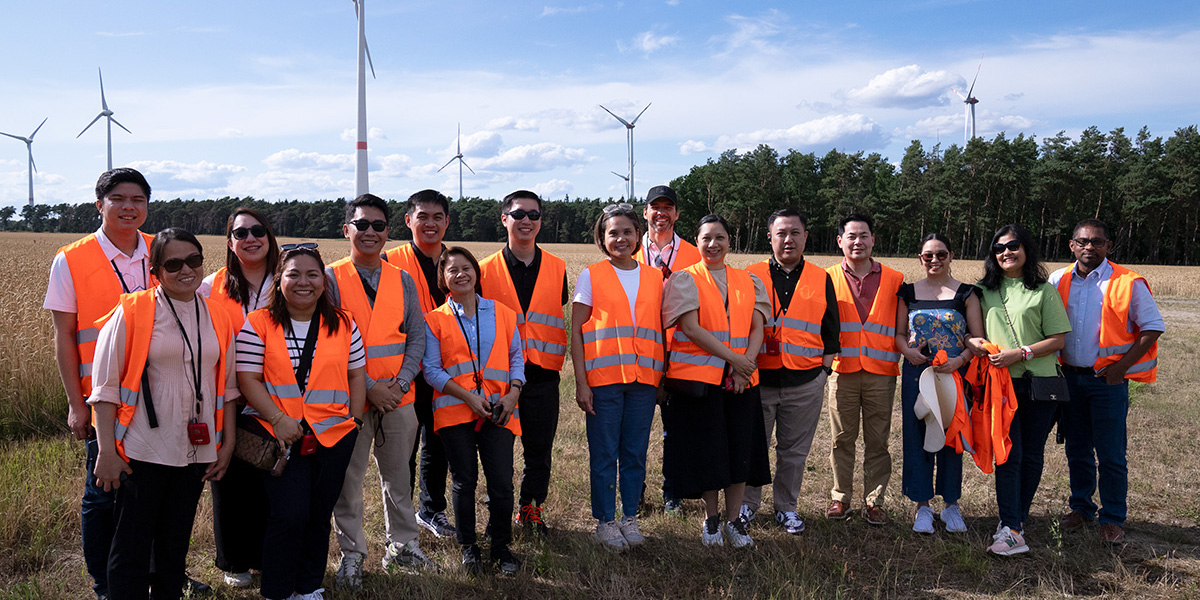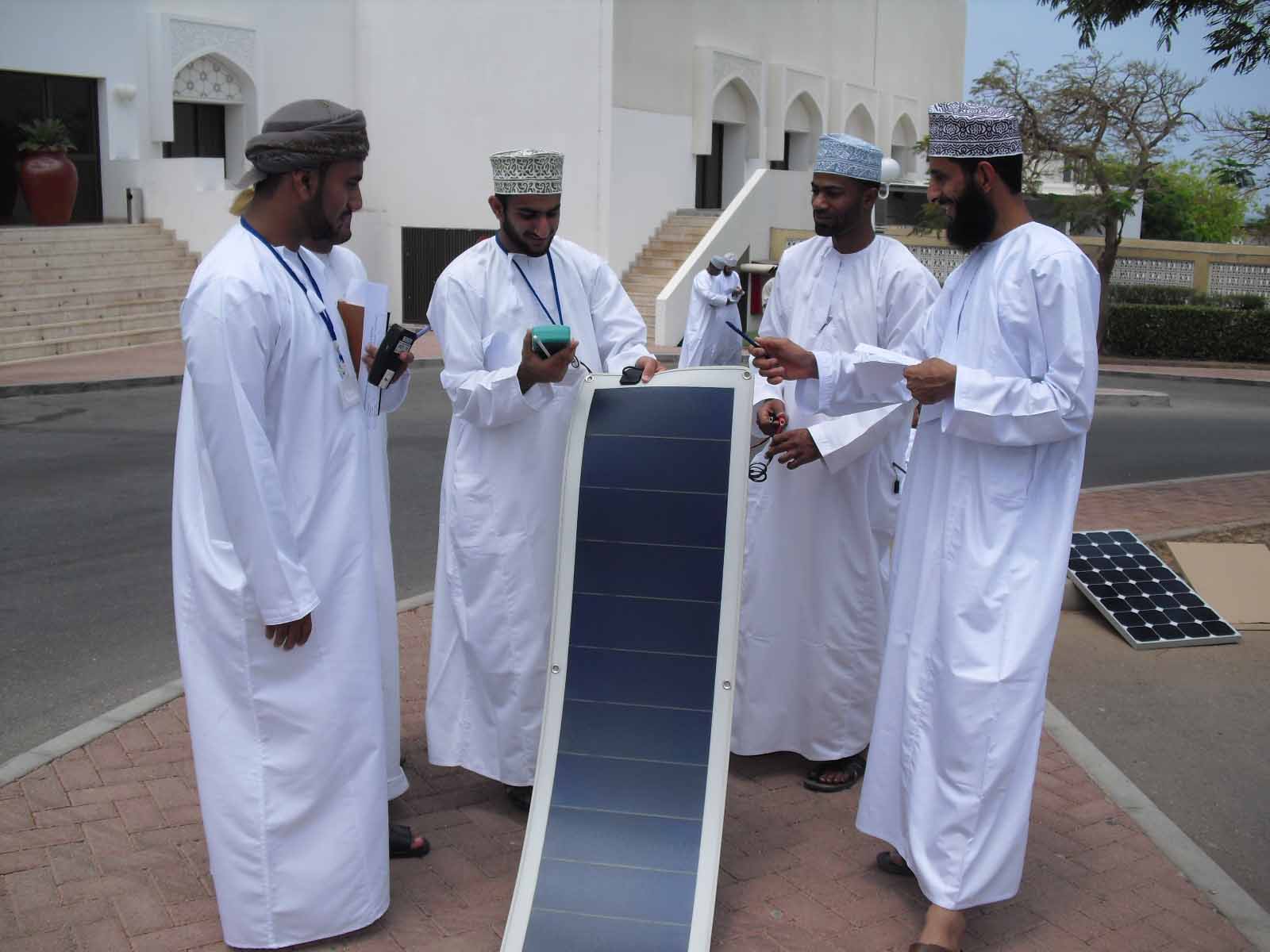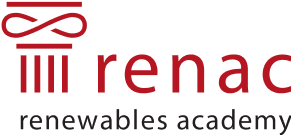This website uses cookies so that we can provide you with the best user experience possible. Cookie information is stored in your browser and performs functions such as recognising you when you return to our website and helping our team to understand which sections of the website you find most interesting and useful.
Customer-specific programmes

Job requirements in the green energy markets are complex and manifold. To ensure a company or organisation success, employees need extensive skills and up-to-date know-how.
RENAC customer-specific programmes offer the best way to meet participants’ training objectives:
- Analysis of participants’ capacity needs
- Selection of training contents and methods according to prior knowledge and needs
- The most suitable trainers
- Development of comprehensive materials with the highest quality standards
- Implementation of the training
Additionally, the training can be adjusted in duration and depth, organised for groups of various sizes and adapted to cover various technologies. Clients can determine when and where the training takes places.
Filter and search
Type
Name
Duration
Study time
Info
- IRR, LCOE, NPV, risk and uncertainty, time value of money
hours
Content:
• RE project financing options
• RE project risks and uncertainties
• Basic financial principles
• Financial performance indicators
Learning objectives:
After completing the course, participants will be able to:
• Describe the principal setting of a renewable energy project, incl. relevant stakeholders, development processes and project appraisal structure
• Explain the most important economic parameters used in renewable energy project planning
• Perform some example calculations of the basic economic parameters, e.g. the internal rate of return (IRR)
Target group:
This training suits those who
• Are or will be involved in financial valuation of RE and EE projects
• Want to engage in RE or EE project development, investment or finance
• Need to understand the financial principles of any kind of investment
Professionals from the energy sector, policy makers (lawyers, economists, scientists, political scientists, engineers), project developers
- mini-grids, operation and maintenance, Sub-Sahara Africa
hours
Content:
- Mini-grid fundamentals and potential in Sub-Saharan Africa (SSA)
- What is a mini-grid? Operation principles and main elements
- The mini-grid ecosystem
- Energy demand assessment
- System design and financial analysis of a mini-grid
- Mini-grid Management, Operation and Maintenance
Learning objectives:
After completion of this course, participants will be able to:
- Discuss the mini-grid approach to electrify a given community/area;
- Explain the mini-grid operation principle and main equipment functionalities;
- Identify the main groups to be integrated on the mini-grid design, construction, management, operation and maintenance
- Learn about main requirements in terms of licensing and permits;
- Conduct a first aggregate energy demand estimation for the community;
- Identify design parameters conditioned by energy demand and available energy sources, and its impact on the project CAPEX and OPEX;
- Identify the financial variables for the mini-grid economic viability assessment;
- Explain the main aspects of mini-grid operation and maintenance;
Target group:
This training suits professionals who
- Intend to introduce and enhance the financing of green energy systems in their financial institution (e.g. bank managers and staff);
- Intend to promote green energy finance in the financial sector (e.g. policy and decision makers, public organisations)
- Aim at promoting investments in green energy mini-grids among potential investors in the SME sector (e.g. project developers, representatives from associations, consultancies)
- Are potential investors for green energy systems, specifically mini-grids (e.g. SMEs, large cooperatives, project developers)
- hybridisation, micro-grids, mini-grids, solar home systems, storage
Content:
• Rural electrification with PV off-grid systems
• PV-diesel hybrid mini-grids (with and without energy storage)
• Solar water pumping
• Project risk analysis, mitigation strategies
• Financial analysis and economics of PV off-grid
• Productive use of energy with rural electrification
• Business models development and pitching for rural electrification
• System design of PV off-grid
• Hands-on work with solar equipment, incl. the assembly of your own PV off-grid systems
• Site visit to a PV off-grid system or company
Learning objectives:
This training suits those whoAfter the seminar participants will be able to……
• Evaluate suitable applications for PV off-grid systems
• List all major components and identify their functions
• Evaluate options to replace an existing (diesel) generator with a PV off-grid system
• Calculate how much fuel and emissions can be saved using PV off-grid systems
• Differentiate between stand-alone and hybrid operation
• Design and estimate costs of solar water pumping
• Visit a potential project site and analyse the solar resource
• Size a PV off-grid / hybrid plant
• Assess key success factors for rural electrification projects
• Evaluate project risks and mitigation strategies
• Understand how to productively use generated electricity in rural areas
• Explain business/ownership models (e.g. PAYGO)
• Develop a business model and pitch it to the participants
Target group:
This training suits those who…
• have no solid solar PV knowledge base
• are staff of international development cooperation organizations, REAs, development banks, private companies, etc.
• (desire to be) involved in rural electrification projects using solar PV
- hybridisation, micro-grids, mini-grids, off-grid
Content:
• Brownfield and greenfield hybridization projects using solar PV
• Evaluate project risks and mitigation strategies
• Financial analysis and business case
• Hands-on work with solar equipment
• Site visit to a PV-hybrid company
Learning objectives:
After the seminar participants will be able to…
• Evaluate suitable hybridization projects
• List all major components, identify their functions and how they can be coupled
• Identify energy efficiency as one key success factor
• Analyse the functionality of an energy management system
• Visit a potential project site and analyse the solar resource
• Size a solar PV array and battery storage (lead-acid and Li-Ion) to meet the energy demand of a rural electrification project
• Evaluate project risks and mitigation strategies
• Analyze the hybridization business case (fuel and emissions savings)
Target group:
This training suits those who:
• are responsible for power generation systems in rural areas
• want to integrate solar hybrid solutions into their portfolio
• need to evaluate the opportunities of PV-diesel hybridization.
- commissioning, engineering, off-grid, sizing, solar home systems
Content:
• Applications
• Components: solar panels, charge controllers, batteries, inverters
• System configurations
• Site surveys: solar irradiation and shading
• Energy efficiency considerations
• System sizing
• Operation and maintenance (O&M)
• System installation: hands-on work with real components.
Learning objectives:
After the seminar participants will be able to…
• Evaluate components, system topologies and available industry products
• Assess energy savings potential and calculate suitable system sizes
• Identify project risks and mitigation strategies
• Install a simple off-grid system and perform some commissioning tasks.
Target group:
This training suits those who:
• Are technically responsible for power generation systems in rural areas
• Want to integrate solar photovoltaic (PV) solutions into their portfolio
• Need to evaluate the technical potential of small-scale off-grid PV systems.
- maintenance plans, management of operation, optimisation, performance evaluation, troubleshooting
Content:
• Basics about operation and maintenance of PV systems
• Asset management
• PV system assessment, performance analysis and optimization
• PV systems maintenance (preventive, corrective and predictive)
• Troubleshooting for PV systems
• Reporting
• Health and safety
• Case studies
Learning objectives:
After the seminar participants will be able to…
• Identify the requirements for proper PV system O&M
• Evaluate the performance of a PV plant
• Pinpoint the measures for performance optimization and troubleshooting
• Plan and manage the O&M procedures including heath and safety and reporting
Target group:
This training suits those who…
• Operate PV plants
• Implement maintenance services for PV systems
• Optimize the performance of PV plants
- active side of the building, energy audits, energy performance certificates, legal framework, passive side of the building
Content:
- Basics of Energy Efficiency in Buildings
- Architectural design principles and passive solutions for energy efficient buildings
- Modern constructions and materials of energy efficient buildings.
- Active side: Modern building technologies
- Energy Management: Definition, Methodology, Instruments and Applications
- Energy Monitoring: Meters, sensors, monitoring net structure, analysis of data
- Energy Audits: Scope, data collection and analysis
- Energy Certification
- Energy performance of existing buildings
- Energy Efficient Procurement and Contracting
- Economics and financing
Learning objectives:
After the seminar, participants will be able to:
- Identify the potential of energy efficiency in the built environment
- Describe energy flows within a building and their balance
- Explain architectural design principles and passive solutions for energy efficient construction
- Compare energy efficient active system in the built environment
- Name international standards used for the assessment of the energy performance of buildings
- Describe the processes of energy management, auditing and monitoring in buildings
Target group:
This training suits:
- Senior management positions in real estate companies
- Energy ministries
- Engineers and architects who want to get an insight into energy efficiency
- contracting, cross-sectoral technologies, economics, energy management, legal framework, procurement
Content:
- Introduction to energy efficiency
- Energy Management: Definition, Methodology, Instruments and Applications
- Energy Management Systems: ISO 50001:2011
- Energy Monitoring: Meters, sensors, monitoring net structure, analysis of data
- Energy Audits: Scope, data collection and analysis
- Cross sectional technologies for heating and cooling
- Electricity based cross sectional technologies
- Cogeneration and trigeneration
- Energy Efficient Procurement and Contracting
- Economics and economic evaluation
- Legal framework and government instruments
Learning objectives:
After the seminar, participants will be able to:
- Explain the basic functions of cross-cutting technologies in industry and the respective application areas
- Identify technical measures to enhance energy efficiency with regard to the respective cross-cutting technology
- Classify the technical and economic saving potential of the technical measures to enhance the energy efficiency
- Describe the processes of energy management, auditing and monitoring
- Debate legislative instruments to support energy efficiency
Target group:
This training suits:
- Senior management positions in industrial companies
- Energy ministries
- Engineers who want to get an insight into energy efficiency
- conventional power generation, cost comparison, LCOE, overview / general aspects, RE sources, renewable electricity generation
hours
Content:
• Conventional power generation technology
• Renewable electricity generation technologies
• Cost comparison of power generation technologies
Learning objectives:
After completion of this course, participants will be able to:
- Describe how different thermal power generation technologies work in principle
- Describe how different renewable energy generation technologies work in principle
- Compare power generation technologies based on different cost aspects
- Explain global trends of power generation technologies in terms of investments
Target group:
This training suits those who:
- are interested in renewable energy technologies
- applications, CAPEX, configurations, costs, country case studies, operation and maintenance, overview / general aspects, Sub-Sahara Africa, technology
hours
Content:
- Introduction
- Solar PV: technology review
- Solar PV: system configuration
- Applications
- System costs/ CAPEX
- Operational expenditure and operation & maintenance requirements
- Country-specific examples
Learning objectives:
After completion of this course, participants will be able to:
- Describe solar photovoltaics (PV) technology for green energy applications, including its key features
- Differentiate between various configurations and describe their strengths and weaknesses
- Give examples of the application of solar PV in different use cases.
Target group:
This training suits professionals who
- Intend to introduce and enhance the financing of green energy systems in their financial institution (e.g. bank managers and staff);
- Intend to promote green energy finance in the financial sector (e.g. policy and decision makers, public organisations)
- Aim at promoting investments in solar systems among potential investors in the commercial, industrial and agricultural sectors (e.g. project developers, representatives from associations, consultancies)
- Are potential investors for solar cooling systems in the commercial, industrial or agricultural sectors (e.g. cooperatives, SMEs, project developers)
- biofuels, electricity generation technologies, global trends, heating/cooling, overview / general aspects, RE sources
hours
Content:
• Overview of renewable energy sources
• Global status and trends in Renewable Energy use
• Renewable electricity generation technologies
• Renewable heat / cooling
• Renewable transport fuels
Learning objectives:
After completion of this course, participants will be able to
- Define renewable sources of energy
- Know the status of global energy supply (fossil, nuclear, renewable)
- Know the status of renewable energy in global energy supply
- Understand the different renewable energy technologies
- Distinguish renewable power, renewable heat technologies and know types of renewable transport fuels
- Roughly estimate global renewable energy potential
- Name the major benefits of renewables vs. conventional energy production
Target group:
This training suits those who:
• Are interested in renewable energy technologies
- configurations, efficiency, PV cells, PV modules, shading effects
hours
Content:
• PV cells and modules
• PV inverters
• Battery storage
• Other PV system components
• How to implement a good PV system
Learning objectives:
After completing the course, participants will be able to:
- Explain the principles of photovoltaic electricity generation
- Identify the key components of photovoltaic and storage systems and explain their interdependence
- Evaluate the quality of a photovoltaic system
- Contribute to the successful realisation of photovoltaic projects
Target group:
This training suits those who are interested in the details of photovoltaic technology.
Content:
• RE project financing options
• RE project risks and uncertainties
• Basic financial principles
• Financial performance indicators
Learning objectives:
After completing the course, participants will be able to:
• Describe the principal setting of a renewable energy project, incl. relevant stakeholders, development processes and project appraisal structure
• Explain the most important economic parameters used in renewable energy project planning
• Perform some example calculations of the basic economic parameters, e.g. the internal rate of return (IRR)
Target group:
This training suits those who
• Are or will be involved in financial valuation of RE and EE projects
• Want to engage in RE or EE project development, investment or finance
• Need to understand the financial principles of any kind of investment
Professionals from the energy sector, policy makers (lawyers, economists, scientists, political scientists, engineers), project developers
Content:
- Mini-grid fundamentals and potential in Sub-Saharan Africa (SSA)
- What is a mini-grid? Operation principles and main elements
- The mini-grid ecosystem
- Energy demand assessment
- System design and financial analysis of a mini-grid
- Mini-grid Management, Operation and Maintenance
Learning objectives:
After completion of this course, participants will be able to:
- Discuss the mini-grid approach to electrify a given community/area;
- Explain the mini-grid operation principle and main equipment functionalities;
- Identify the main groups to be integrated on the mini-grid design, construction, management, operation and maintenance
- Learn about main requirements in terms of licensing and permits;
- Conduct a first aggregate energy demand estimation for the community;
- Identify design parameters conditioned by energy demand and available energy sources, and its impact on the project CAPEX and OPEX;
- Identify the financial variables for the mini-grid economic viability assessment;
- Explain the main aspects of mini-grid operation and maintenance;
Target group:
This training suits professionals who
- Intend to introduce and enhance the financing of green energy systems in their financial institution (e.g. bank managers and staff);
- Intend to promote green energy finance in the financial sector (e.g. policy and decision makers, public organisations)
- Aim at promoting investments in green energy mini-grids among potential investors in the SME sector (e.g. project developers, representatives from associations, consultancies)
- Are potential investors for green energy systems, specifically mini-grids (e.g. SMEs, large cooperatives, project developers)
Content:
• Rural electrification with PV off-grid systems
• PV-diesel hybrid mini-grids (with and without energy storage)
• Solar water pumping
• Project risk analysis, mitigation strategies
• Financial analysis and economics of PV off-grid
• Productive use of energy with rural electrification
• Business models development and pitching for rural electrification
• System design of PV off-grid
• Hands-on work with solar equipment, incl. the assembly of your own PV off-grid systems
• Site visit to a PV off-grid system or company
Learning objectives:
This training suits those whoAfter the seminar participants will be able to……
• Evaluate suitable applications for PV off-grid systems
• List all major components and identify their functions
• Evaluate options to replace an existing (diesel) generator with a PV off-grid system
• Calculate how much fuel and emissions can be saved using PV off-grid systems
• Differentiate between stand-alone and hybrid operation
• Design and estimate costs of solar water pumping
• Visit a potential project site and analyse the solar resource
• Size a PV off-grid / hybrid plant
• Assess key success factors for rural electrification projects
• Evaluate project risks and mitigation strategies
• Understand how to productively use generated electricity in rural areas
• Explain business/ownership models (e.g. PAYGO)
• Develop a business model and pitch it to the participants
Target group:
This training suits those who…
• have no solid solar PV knowledge base
• are staff of international development cooperation organizations, REAs, development banks, private companies, etc.
• (desire to be) involved in rural electrification projects using solar PV
Content:
• Brownfield and greenfield hybridization projects using solar PV
• Evaluate project risks and mitigation strategies
• Financial analysis and business case
• Hands-on work with solar equipment
• Site visit to a PV-hybrid company
Learning objectives:
After the seminar participants will be able to…
• Evaluate suitable hybridization projects
• List all major components, identify their functions and how they can be coupled
• Identify energy efficiency as one key success factor
• Analyse the functionality of an energy management system
• Visit a potential project site and analyse the solar resource
• Size a solar PV array and battery storage (lead-acid and Li-Ion) to meet the energy demand of a rural electrification project
• Evaluate project risks and mitigation strategies
• Analyze the hybridization business case (fuel and emissions savings)
Target group:
This training suits those who:
• are responsible for power generation systems in rural areas
• want to integrate solar hybrid solutions into their portfolio
• need to evaluate the opportunities of PV-diesel hybridization.
Content:
• Applications
• Components: solar panels, charge controllers, batteries, inverters
• System configurations
• Site surveys: solar irradiation and shading
• Energy efficiency considerations
• System sizing
• Operation and maintenance (O&M)
• System installation: hands-on work with real components.
Learning objectives:
After the seminar participants will be able to…
• Evaluate components, system topologies and available industry products
• Assess energy savings potential and calculate suitable system sizes
• Identify project risks and mitigation strategies
• Install a simple off-grid system and perform some commissioning tasks.
Target group:
This training suits those who:
• Are technically responsible for power generation systems in rural areas
• Want to integrate solar photovoltaic (PV) solutions into their portfolio
• Need to evaluate the technical potential of small-scale off-grid PV systems.
Content:
• Basics about operation and maintenance of PV systems
• Asset management
• PV system assessment, performance analysis and optimization
• PV systems maintenance (preventive, corrective and predictive)
• Troubleshooting for PV systems
• Reporting
• Health and safety
• Case studies
Learning objectives:
After the seminar participants will be able to…
• Identify the requirements for proper PV system O&M
• Evaluate the performance of a PV plant
• Pinpoint the measures for performance optimization and troubleshooting
• Plan and manage the O&M procedures including heath and safety and reporting
Target group:
This training suits those who…
• Operate PV plants
• Implement maintenance services for PV systems
• Optimize the performance of PV plants
Content:
- Basics of Energy Efficiency in Buildings
- Architectural design principles and passive solutions for energy efficient buildings
- Modern constructions and materials of energy efficient buildings.
- Active side: Modern building technologies
- Energy Management: Definition, Methodology, Instruments and Applications
- Energy Monitoring: Meters, sensors, monitoring net structure, analysis of data
- Energy Audits: Scope, data collection and analysis
- Energy Certification
- Energy performance of existing buildings
- Energy Efficient Procurement and Contracting
- Economics and financing
Learning objectives:
After the seminar, participants will be able to:
- Identify the potential of energy efficiency in the built environment
- Describe energy flows within a building and their balance
- Explain architectural design principles and passive solutions for energy efficient construction
- Compare energy efficient active system in the built environment
- Name international standards used for the assessment of the energy performance of buildings
- Describe the processes of energy management, auditing and monitoring in buildings
Target group:
This training suits:
- Senior management positions in real estate companies
- Energy ministries
- Engineers and architects who want to get an insight into energy efficiency
Content:
- Introduction to energy efficiency
- Energy Management: Definition, Methodology, Instruments and Applications
- Energy Management Systems: ISO 50001:2011
- Energy Monitoring: Meters, sensors, monitoring net structure, analysis of data
- Energy Audits: Scope, data collection and analysis
- Cross sectional technologies for heating and cooling
- Electricity based cross sectional technologies
- Cogeneration and trigeneration
- Energy Efficient Procurement and Contracting
- Economics and economic evaluation
- Legal framework and government instruments
Learning objectives:
After the seminar, participants will be able to:
- Explain the basic functions of cross-cutting technologies in industry and the respective application areas
- Identify technical measures to enhance energy efficiency with regard to the respective cross-cutting technology
- Classify the technical and economic saving potential of the technical measures to enhance the energy efficiency
- Describe the processes of energy management, auditing and monitoring
- Debate legislative instruments to support energy efficiency
Target group:
This training suits:
- Senior management positions in industrial companies
- Energy ministries
- Engineers who want to get an insight into energy efficiency
Content:
• Conventional power generation technology
• Renewable electricity generation technologies
• Cost comparison of power generation technologies
Learning objectives:
After completion of this course, participants will be able to:
- Describe how different thermal power generation technologies work in principle
- Describe how different renewable energy generation technologies work in principle
- Compare power generation technologies based on different cost aspects
- Explain global trends of power generation technologies in terms of investments
Target group:
This training suits those who:
- are interested in renewable energy technologies
Content:
- Introduction
- Solar PV: technology review
- Solar PV: system configuration
- Applications
- System costs/ CAPEX
- Operational expenditure and operation & maintenance requirements
- Country-specific examples
Learning objectives:
After completion of this course, participants will be able to:
- Describe solar photovoltaics (PV) technology for green energy applications, including its key features
- Differentiate between various configurations and describe their strengths and weaknesses
- Give examples of the application of solar PV in different use cases.
Target group:
This training suits professionals who
- Intend to introduce and enhance the financing of green energy systems in their financial institution (e.g. bank managers and staff);
- Intend to promote green energy finance in the financial sector (e.g. policy and decision makers, public organisations)
- Aim at promoting investments in solar systems among potential investors in the commercial, industrial and agricultural sectors (e.g. project developers, representatives from associations, consultancies)
- Are potential investors for solar cooling systems in the commercial, industrial or agricultural sectors (e.g. cooperatives, SMEs, project developers)
Content:
• Overview of renewable energy sources
• Global status and trends in Renewable Energy use
• Renewable electricity generation technologies
• Renewable heat / cooling
• Renewable transport fuels
Learning objectives:
After completion of this course, participants will be able to
- Define renewable sources of energy
- Know the status of global energy supply (fossil, nuclear, renewable)
- Know the status of renewable energy in global energy supply
- Understand the different renewable energy technologies
- Distinguish renewable power, renewable heat technologies and know types of renewable transport fuels
- Roughly estimate global renewable energy potential
- Name the major benefits of renewables vs. conventional energy production
Target group:
This training suits those who:
• Are interested in renewable energy technologies
Content:
• PV cells and modules
• PV inverters
• Battery storage
• Other PV system components
• How to implement a good PV system
Learning objectives:
After completing the course, participants will be able to:
- Explain the principles of photovoltaic electricity generation
- Identify the key components of photovoltaic and storage systems and explain their interdependence
- Evaluate the quality of a photovoltaic system
- Contribute to the successful realisation of photovoltaic projects
Target group:
This training suits those who are interested in the details of photovoltaic technology.
Target Groups
Public sector officials for legal frameworks, regulation and implementation:

- Ministries
- Regulators
- Local administrations
Multipliers and development organisations:

- Development corporations
- Energy agencies
- International financing institutions
- NGOs
Private sector:

- Project developers
- System integrators
- Engineers and technicians
- Investors
- Financing institutions
- Grid operators
Capacity building and dissemination sector:

- Public and private training institutions
- Vocational training institutions
- Universities
Value Chain
We design and implement customer-specific programmes and services along the value chain in a holistic concept.
Our approach to Renewable Energy (RE) and Energy Efficiency (EE) is manifold: technology related knowledge is the basis and then each RENAC training and service focus on technical, economic, legal or project related aspects according to the target group. RENAC is also very active in international business matchmaking and market development services.
In our capacity building services we supply a variety of programmes to train trainers, to build training centres and to establish quality assurance processes.
Our Training Concept
Customer-Specific Programmes – what does it mean?
We offer customer-specific programmes according to client needs and participant job requirements in all green energy sectors. Based on an analysis of requested knowledge or specific job tasks and the level of existing knowledge, we develop a training concept proposal.
The concept includes recommendations for online or in-person trainings, or both. We develop the training concept taking the given resources on budget and learning time into account. After feedback from the client, we fine-tune the concept for approval.
Depending on the needs of our clients, we offer different levels of trainings (basic, intermediate, and advanced).

Service Catalogue
Find detailed information about the programme that best aligns with your needs and preferences.
Are you interested in a Customer-specific programmes?
Kindly fill out this questionnaire and attach it to the form on the right:
© 2024 | Renewables Academy (RENAC) AG



